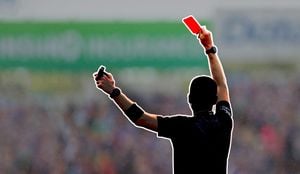Romania's upcoming presidential election has stirred significant attention and concern, particularly with the emergence of Călin Georgescu as one of the frontrunners. The independent candidate, who managed to secure the first position in the first round of voting, is garnering both support and criticism for his openly far-right stance.
Unexpectedly, Georgescu's rise has left many astonished. He is described by some as a "black swan"—a term often used to depict unpredictable or unprecedented events. The immediate reaction within Romania points to the turmoil brewing beneath the surface of Romanian politics, which is experiencing growing dissatisfaction with the traditional political establishment.
Moving to the runoff election, Georgescu is set to face off against Elena Lasconi, the pro-European candidate from the Save Romania Union party. The political backdrop to this contest reflects deep fractures within the Romanian electorate, particularly among those who feel disenfranchised by the status quo. Many of Georgescu's supporters appear to be protest voters, disillusioned with the continuous dominance of mainstream parties.
Georgescu's campaign stands out due to his stark worldview and controversial opinions. He does not shy away from embracing far-right ideologies, which has led to labels likening him to Nazi sympathizers. This characterization stems from his apparent glorification of Romania's historical alignment with Nazi Germany under the dictatorship of Ion Antonescu, whom Georgescu controversially refers to as a 'martyr.'
Critics are disturbed by his criticisms of Western alliances. Georgescu has made waves by condemning NATO and the European Union, as well as expressing strong opposition to the presence of American military bases within Romania. His narrative frequently includes conspiracy theories, including the assertion linked to the war in Ukraine, which he attributes to the machinations of U.S. arms manufacturers.
While there are other independent candidates on the ballot like Mircea Geoană and the more moderate Lasconi, they seem to be overshadowed due to intense scrutiny and attacks from mainstream political factions. Herasymchuk, who penned insightful analyses of this election, provided the observation, 'Compared to the first-round winner, even the local eccentric... seems moderate and restrained.' This underlines the growing polarization within Romanian politics.
Support for Georgescu hints at larger societal patterns, where mainstream parties are losing core voter bases. The support he enjoys reflects frustrations accumulated over years within the electorate. His candidacy has unfolded against the backdrop of discontent with the grand coalition of the Social Democrats and the National Liberals, traditional heavyweights who have seemingly alienated portions of the electorate.
Georgescu’s success signals not just the rise of far-right sentiment but also serves as alarming evidence of the electorate's discontent with traditional political parties. This echoes broader trends observed around the world where populism is leading to radical candidates gaining traction.
Many political analysts advocate against panicking just yet, indicating Romania's political mechanisms will likely mount defense against such polarizing figures making it to the presidency. Critics warn, though, the rise of such candidates signals something potentially ominous for the future political climate, both domestically and for Europe.
With Europe confronting major geopolitical issues—especially illustrated by the war raging next door in Ukraine—actors like Georgescu serve as uncomfortable reminders of the fragility of political stability and the risks associated with rising nationalism.
Herasymchuk poignantly remarks, "If Europe faces a major war, it approaches it dangerously weakened." His insights present the possibility concerning not just Romania’s future, but the broader standing of European democracy itself, as fractures deepen and the distance grows from European ideals embraced post-World War II.
Going forward, the focus now shifts to the runoff election where Georgescu's potential victory remains uncertain. Many await the outcome with bated breath, eager to ascertain whether Romania will follow this troubling trend or retreat back toward more centrist values. Either outcome suggests wider ramifications for the region, as the durability of democratic norms continues to be tested.
While observers will closely monitor the election, one aspect remains clear — the discontent expressed by voters has manifested through Georgescu. The broader conversation stemming from this election highlights the conflicting needs and aspirations of Romanian society and its quest for identity, governance, and future relationships within Europe.



